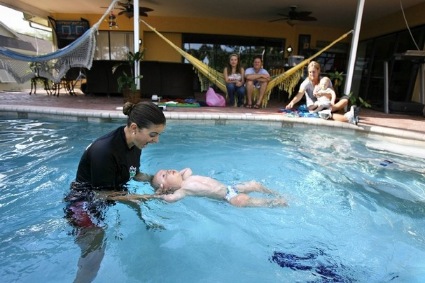
Naples, FL - The children of fire fighters, police officers and other first responders in the Naples and Bonita Springs area are the first participants in a drowning prevention program for babies. Infant Swimming Resource, an Oviedo, Fla.-based teaching program, has pledged $10,000 to the Naples Water Safety Initiative to give complimentary lessons to the children of 50 first responders.
The children of fire fighters, police officers and other first responders in the Naples and Bonita Springs area are the first participants in a drowning prevention program for babies.
Infant Swimming Resource, an Oviedo, Fla.-based teaching program, has pledged $10,000 to the Naples Water Safety Initiative to give complimentary lessons to the children of 50 first responders.
Founded in 1966 by Harvey Barnett, M.D., Infant Swimming Resource (ISR) is a drowning prevention program that teaches infants and children. The ISR program instructs children how to rescue themselves from the water if they find themselves in it without adult supervision. The success of this program can be witnessed in the statistics: It has a 100 percent safety record.
For children younger than the age of 4, drowning is the leading cause of accidental death in Naples. This is why ISR has offered free lessons for the children of Naples’ first responders. Since they are the first on the scene in drowning or near-drowning cases, ISR decided that their children should be the ones to see what this training does.
Melody Callaway, ISR media relations spokeswoman, says first responders “always want to know what can be done and how this tragedy can be prevented.”
The first step is to ensure that there are safety features put in place around pools — which parents learn about at the same time their child is learning — and that there is always an adult supervising children when they are around water. The second step is to ensure that children know the self-rescue techniques.
“If all the barriers that have been set up fail and a child escapes supervision for one minute — they know how to swim to safety or roll onto their backs and float until help arrives.”
Fernanda Whitney, ISR instructor for the Naples area, begins giving lessons this week. Whitney’s story for becoming and ISR instructor begins with a tragedy: “I had a cousin who died in a drowning accident,” she says. When her own daughter was 6 months old, she decided the best way to avoid another drowning tragedy was to arm her daughter with the skills of self-rescue. So Whitney drove her to an ISR class in Fort Myers. Realizing that not all parents in Naples had the time to drive to Fort Myers for lessons, Whitney decided to bring it here.
Whitney says ISR lessons also teach the children to remain calm while they are in the pool: “They learn to be confident and to enjoy the water.”
This helps to prevent them from panicking in an accidental situation. While teaching the kids in the pool, Whitney monitors biological factors, such as body temperature and abdomens, to ensure that they are safe and comfortable.
“The lessons are not scary,” she emphasizes. “We always try to work towards something familiar with them.”
Whitney recently offered a demonstration of how she teaches two children at different levels. Rylan, one of her students, is a happy baby boy who is almost 1 year old, and Whitney’s own daughter, Sophia, 2½, was the other.
Sophia was first. She was just as eager as her mother to get into the pool. Her confidence was obvious as she laughed and smiled just before swimming. Her head was completely under water as she kicked and paddled towards the edge of the pool. Then, she flipped onto her back and floated for a few seconds to allow her body to rest. Sophia then rolled back over and dunked her head below the surface as she swam the rest of the way. She demonstrated this swim-float-swim technique several times during her lesson.
Rylan, who was only in his second week of lessons, had just learned breath control and was now working on his floating abilities.
“The first thing we teach all the children is breath control,” Whitney says. Now that Rylan has learned how to close his mouth in the water, he was more than ready to enter the pool as he waddled towards Whitney. Since Rylan is not quite a year old yet, and since this is only his second week of lessons, he only has to master the float. The swimming part will come later, Whitney said.
Rylan’s father, Eric Manring, smiled as he watched his son floating on his own. Manring decided to enroll Rylan in lessons after seeing his niece succeed in the program.
“Seeing a 1-year-old float on her back for 10-15 seconds and then swim is amazing. She can barely walk,” he said.